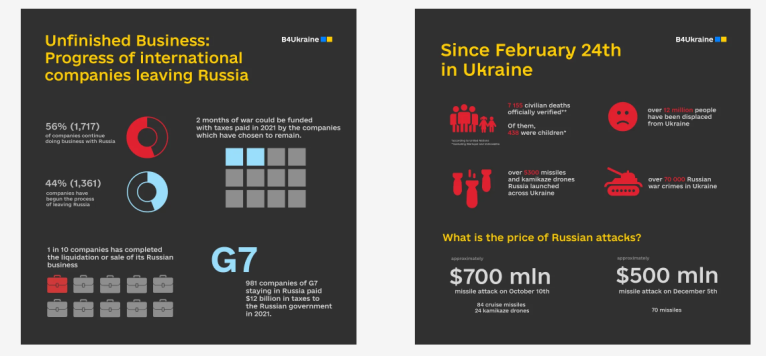One year ago today, Russia launched an invasion of Ukraine. Appropriately, today’s headlines report the devastating consequences in lives lost and displaced persons. There have been somewhere around 300,000 military and civilian deaths, and the conflict has generated an additional 8,087,952 Ukrainian refugees living abroad and millions more displaced within the country. The Ukrainian government database of crimes of aggression and war crimes committed by the Russian military ended the week at 71,321, according to this tweet. The gruesome tally underscores both the severe and systemic nature of Russia’s violations of international law and the severe risks for companies that have operations and relationships in the country.
The war’s devastating impact affects many more countries. As Ukraine is a breadbasket for grains, the war has undermined global food security. The war spiked global energy costs, exacerbating an existing energy crisis.
At the same time, the hostilities prompted new strategies for coordinating and targeting international sanctions that have been swift and significant. Even today, the U.S. and allies introduced new sanctions. As well, on this anniversary, Russia became the first country ever to be expelled from Financial Action Task Force, an intergovernmental body that sets anti-money-laundering law standards
An element that needs more attention is the ongoing collaboration by global companies with the Russian aggressors. Their denials aside, those companies still operating in Russia are materially involved in the Russian war effort as they comply with the terms of Russia’s mobilization law. This article from B4Ukraine offers additional data points and analysis, and it draws a firm conclusion:
“Threats to profits and portfolios, but most importantly to the Ukrainian people, lead to one inevitable conclusion for businesses – to end all operations and business relationships with the Russian government or risk being complicit in its crimes.”
In light of the severe risks endemic to conflict, the UN Business and Human Rights Working Group developed a tool for that due diligence, published last June: Heightened Due Diligence for Business in Conflict-Affected Contexts: A Guide. As mandatory due diligence legislation continues its advance in the European Union, alongside a growing body of international jurisprudence, investors can no longer ignore geopolitical risks associated with autocracy, military aggression, and corruption.
The war confirms that investors need to improve human rights due diligence processes. Given Russia’s human rights history over recent decades, some investors preempted this foreseeable issue. Other investors belatedly found that companies had undue exposure to Russia. At the outset of the war, SGI called for companies to conduct heightened due diligence to ensure that their activities do not support the Russian war effort. As well, SGI joined a coalition of investors who quickly condemned the act of aggression and called on companies to undertake heightened human rights due diligence. That coalition letter, and other efforts where SGI has participated, have received critical support from our colleagues at the Heartland Initiative. With their support, SGI has joined letters and dialogues with technology and finance firms about risks associated with their operations in Russia.
Sadly, those calls have gone unheeded in many quarters. New data shows that companies’ responses fall far short of what is required under international frameworks, like the UN Guiding Principles on Business and Human Rights. A new report, Unfinished Business, based on data from the Kyiv School of Economics examining 3,078 multinationals found that 56% (1,717 companies) which had ties to Russia at the start of the war continue to do business with the country. The data also showed that:
“Of the companies that had a local Russian subsidiary at the start of the full-scale invasion of Ukraine, only one in ten has completed the liquidation or sale of its Russian business.
“The remaining companies paid at least $18 billion in taxes to Russia in 2021 — enough to fund Russia’s war against Ukraine for two months.”

Our keynoter from last fall’s conference, Bennett Freeman wrote about these concerns in a recent article for the Business and Human Rights Resource Centre. He concludes with an observation and a question:
“This tragic anniversary challenges the remaining foreign companies still operating in Russia to leave. At the same time, will a new geopolitical corporate responsibility take shape – and take action – in time to help fortify the battered remnants of the international rules-based order?”
A year ago, CEOs of global companies offered statements against the war. On this sad anniversary, we want to call companies to prioritize actions over words. Companies like Procter & Gamble, Mondelez, Nestle, Baker Hughes, Schlumberger, and Johnson & Johnson would do well to heed the words of Benjamin Franklin: “He that lieth down with dogs shall rise up with fleas.”

